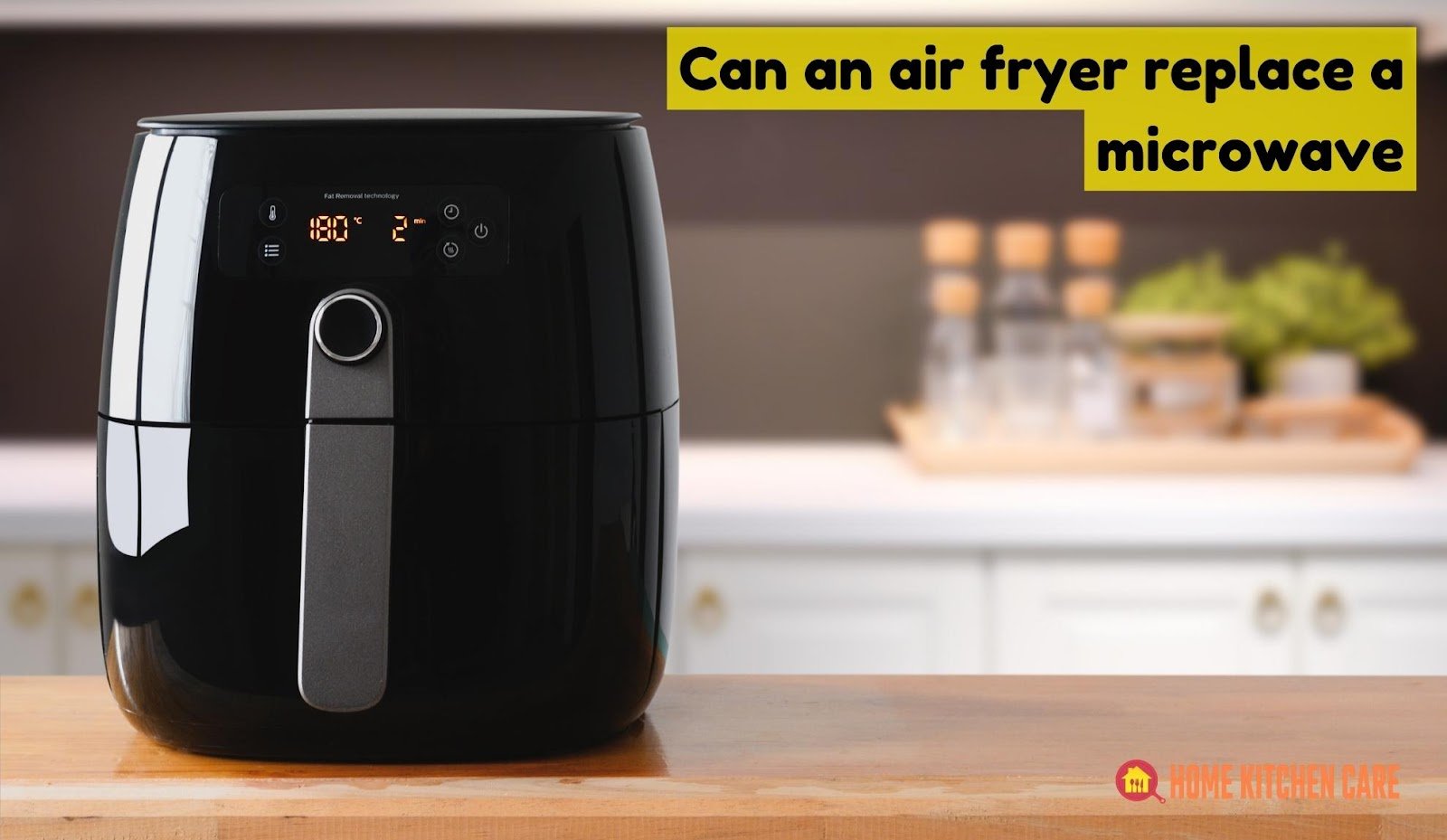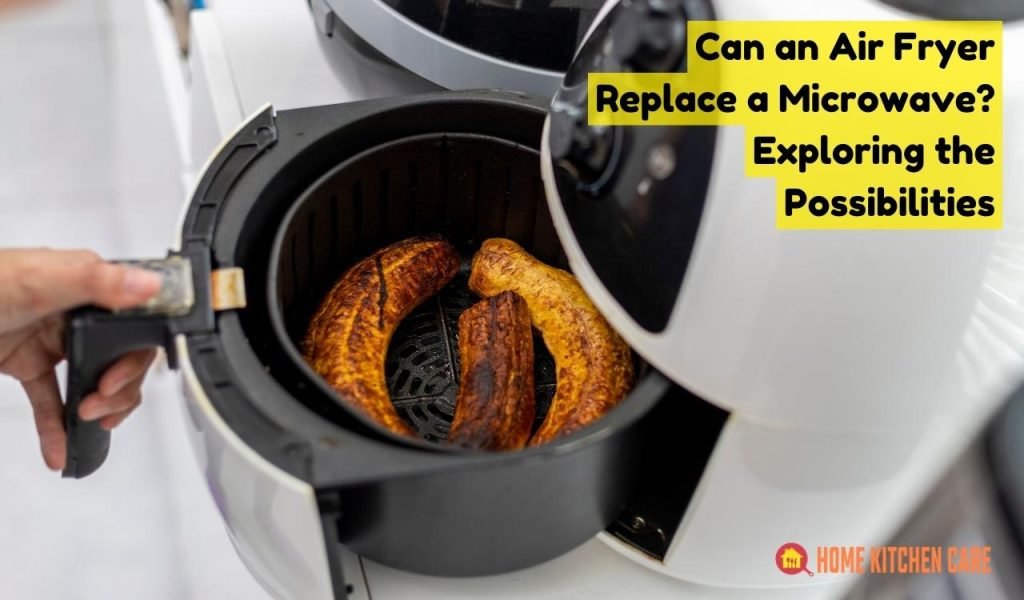Physical Address
304 North Cardinal St.
Dorchester Center, MA 02124
Physical Address
304 North Cardinal St.
Dorchester Center, MA 02124

Can an air fryer replace a microwave? It’s a question that has sparked curiosity among cooking enthusiasts and health-conscious individuals alike. With air fryers gaining popularity for their ability to create crispy, delicious dishes with less oil, many wonder if they can truly take over the microwave’s reign.
In this guide, we’ll delve into the world of air fryers and microwaves, exploring their functionalities, differences, and the potential for one to replace the other. Get ready to discover the sizzling possibilities and uncover whether the air fryer can step up to the plate and become the ultimate microwave alternative.
Let’s embark on this culinary adventure and unlock the secrets of this appliance showdown. Are you ready to rethink your kitchen essentials and explore the realm of air-fried wonders? Let’s dive in!
Main Summary: Can an Air Fryer Replace a Microwave?
Air Fryers can’t fully replace Microwaves. While both heat food quickly, Air Fryers use hot air to create crispy results, ideal for certain dishes. However, Microwaves offer unmatched convenience, speed, and versatility for reheating, defrosting, and cooking a wide range of foods. Choose based on your needs!

An air fryer is a compact countertop appliance that revolutionizes cooking by harnessing the power of hot air circulation. It utilizes a combination of a heating element and a high-speed fan to create a controlled environment of circulating hot air.
This innovative cooking method allows the air fryer to mimic the results of deep frying with minimal or no oil, making it a healthier alternative. When you place food inside the air fryer’s cooking chamber, the heating element quickly heats the air.
The fan then evenly distributes the hot air, ensuring that every inch of the food is exposed to the heat. This rapid and consistent circulation of hot air creates a convection effect, resulting in a crispy exterior and evenly cooked interior. The air fryer’s temperature control mechanism ensures precise cooking, giving you delicious and satisfying meals every time.
With its ability to fry, grill, roast, and bake a wide variety of foods, an air fryer has become a versatile and popular kitchen appliance. Whether you’re craving crispy french fries, succulent chicken wings, or perfectly roasted vegetables, the air fryer can deliver impressive results with ease.
The inner workings of an air fryer are fascinating and involve several key components working together to achieve delicious results. Here’s a closer look at how an air fryer works:
Using an air fryer offers a multitude of benefits that make it a worthwhile addition to any kitchen. Here are some detailed advantages of using an air fryer:
When it comes to the debate between an air fryer and a microwave, understanding their differences and capabilities is crucial. Here’s a comprehensive comparative analysis to help you make an informed decision:
When contemplating replacing a microwave with an air fryer, it’s important to consider certain factors to make an informed decision. Here are some key points to avoid potential pitfalls:
While air fryers offer a wide range of cooking options, they may not fully replace the functionality of a microwave. Microwaves excel at tasks such as defrosting, quick reheating, and even cooking certain dishes.
Consider whether the air fryer can adequately fulfill these specific microwave functions you rely on regularly.
Air fryers generally occupy more countertop space compared to microwaves. Ensure that you have enough room in your kitchen to accommodate the air fryer, taking into account its size and any additional accessories or attachments. Consider the available storage options as well.
Air fryers typically require longer cooking times compared to microwaves. If you rely on the quick cooking speed of a microwave for your busy lifestyle, transitioning solely to an air fryer may result in increased cooking times and potential inconvenience.
Operating an air fryer involves a learning curve, especially if you are accustomed to using a microwave. Familiarize yourself with the functions, settings, and cooking techniques specific to air fryers to achieve optimal results.
Be prepared to invest time and effort in understanding the equipment and adjusting your cooking methods accordingly.
Air fryers can be more expensive than microwaves, depending on the brand and model. Before making the switch, evaluate your budget and ensure that the cost of the air fryer aligns with your financial capabilities.
Additionally, consider the long-term savings from reduced oil usage, if that is a factor in your decision.
Assess your specific cooking needs and preferences. If you heavily rely on microwave-specific functions or frequently cook certain dishes that are better suited for microwaves, replacing it with an air fryer may not be the most practical choice.
Consider whether the versatility and benefits of an air fryer align with your culinary requirements.
Consider the needs and preferences of your family or household members. If they heavily rely on microwave functions or have specific dietary preferences that require microwave-friendly cooking techniques, it’s important to take those factors into account before completely replacing the microwave.
Air fryers generally require more maintenance and cleaning compared to microwaves. They have multiple components, such as trays, baskets, and racks, which need regular cleaning to maintain optimal performance and food quality.
Assess your willingness to invest time in cleaning and maintaining the air fryer properly.
When considering replacing a microwave with an air fryer, it’s important to evaluate the energy efficiency of both appliances. Microwaves are generally more energy-efficient for quick heating tasks, as they use electromagnetic waves to directly heat the food.
On the other hand, air fryers require longer cooking times and rely on convection heat, which may result in slightly higher energy consumption. Consider the impact on your energy bills and environmental footprint before making the switch.
It’s crucial to understand that not all recipes can be easily adapted from microwave cooking to air frying. Some dishes may require specific moisture levels or the direct application of microwave energy, which cannot be replicated in an air fryer.
Take into account your favorite recipes and assess their compatibility with air frying techniques. Research and experiment with air fryer-specific recipes to ensure you can still enjoy a wide variety of dishes without compromising taste and quality.
In conclusion, whether an air fryer can replace a microwave depends on individual preferences and cooking needs. While air fryers offer healthier frying options and versatility, microwaves excel in speed and convenience for reheating and defrosting.
Consider factors such as available space, cooking habits, and the types of dishes you prepare. Both appliances have their merits, so it’s important to make an informed decision.
Whether you choose to incorporate an air fryer alongside your microwave or fully replace it, consider your cooking goals and find the solution that best fits your lifestyle.
Yes, you can use an air fryer as an alternative to a microwave for certain cooking tasks. Air fryers are great for frying, roasting, baking, and grilling, offering a healthier cooking method compared to microwaves.
However, microwaves excel in reheating and defrosting foods quickly. Consider the specific cooking needs and functionalities required before fully replacing a microwave with an air fryer.
Air fryers can be a good replacement for microwaves depending on your cooking preferences. They provide a healthier alternative to traditional frying methods and offer versatility in cooking various dishes.
However, microwaves are still more efficient for quick reheating and defrosting tasks. Assess your cooking habits and priorities to determine if an air fryer can adequately fulfill your needs as a microwave replacement.
Air fryers and microwaves differ in their cooking methods and functionalities. Air fryers use hot air circulation to cook food, resulting in crispy and evenly cooked dishes. Microwaves, on the other hand, use electromagnetic waves to heat food quickly.
Air fryers are suitable for frying, baking, and grilling, while microwaves are best for reheating, defrosting, and quick cooking. Consider the specific cooking tasks you require to determine which appliance suits your needs.
While air fryers can reheat food, microwaves are generally more efficient for this task. Air fryers can reheat certain foods, but they may take longer and may not provide the same level of even heating as microwaves.
Microwaves use radiation to heat food quickly and evenly, making them more suitable for reheating purposes. If quick and efficient reheating is a priority, a microwave is still the preferred appliance.
Using an air fryer can be a healthier option compared to microwaves for certain cooking methods. Air fryers require little to no oil, reducing the overall fat content of fried foods. They also help retain more nutrients in vegetables compared to microwaving.
However, microwaves are generally considered safe for cooking as they don’t require oil and preserve the nutritional value of food. Both appliances have their health benefits, so choose based on your specific cooking needs and goals.
Yes, you can cook frozen meals in an air fryer instead of a microwave. Air fryers are excellent for cooking frozen foods, delivering crispy results. They can handle a variety of frozen dishes such as fries, chicken nuggets, and even frozen pizzas. The hot air circulation in air fryers ensures even cooking and crispy textures.
However, be sure to follow the instructions on the frozen meal packaging or refer to air fryer recipes for optimal cooking times and temperatures.
Air fryers offer several advantages over microwaves. They provide a healthier alternative to deep frying, requiring little to no oil. Air fryers also offer versatility in cooking methods, allowing you to fry, roast, bake, and grill. They can produce crispy textures and even cooking results.
However, microwaves excel in quick reheating and defrosting tasks. Consider your cooking preferences and needs to determine which appliance best suits your requirements.
While air fryers can replace microwaves for many cooking tasks, they may not be suitable for all. Air fryers are ideal for frying, baking, and grilling, providing crispy and evenly cooked results.
However, microwaves are more efficient for quick reheating, defrosting, and certain cooking tasks. Evaluate the specific cooking needs and functionalities you require before deciding whether an air fryer can fully replace a microwave in your kitchen.
Air-fried foods may not be as quick and convenient as microwaved foods. Microwaves excel in their ability to quickly heat food, making them highly convenient for reheating and quick cooking. Air fryers, on the other hand, require longer cooking times, especially for achieving crispy textures.
While air fryers offer delicious results, they may not match the speed and convenience of microwaves for certain tasks. Consider the time and convenience factors when choosing between the two.
The taste and texture of food cooked in air fryers and microwaves differ. Air fryers create crispy exteriors and moist interiors, resulting in delicious textures. They can mimic the taste and texture of deep-fried foods with less oil.
Microwaves, however, may not provide the same level of crispiness and browning as air fryers. Microwaved foods are often heated evenly but may lack the desired textures. Consider your preferences for taste and texture when choosing between air fryers and microwaves for cooking.